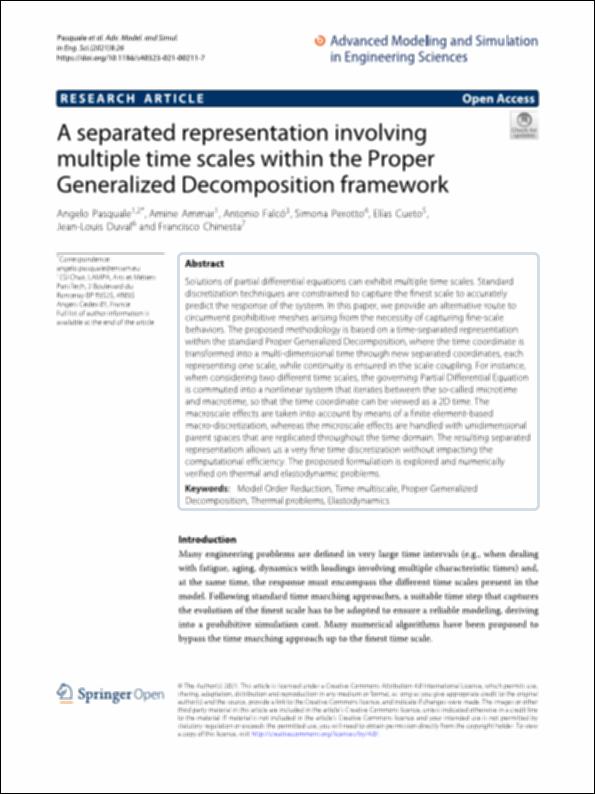Por favor, use este identificador para citar o enlazar este ítem:
http://hdl.handle.net/10637/14138A separated representation involving multiple time scales within the Proper Generalized Decomposition framework
| Título : | A separated representation involving multiple time scales within the Proper Generalized Decomposition framework |
| Autor : | Pasquale, Angelo Ammar, Amine Falcó Montesinos, Antonio Perotto, Simona Cueto Prendes, Elías Duval, Jean Louis Chinesta, Francisco |
| Materias: | Decomposition (Mathematics); Differential equations, Partial.; Multidimensional scaling.; Ecuaciones en derivadas parciales.; Escalas multidimensionales.; Descomposición (Matemáticas) |
| Citación : | Pasquale, A., Ammar, A., Falcó, A., Perotto, S., Cueto, E., Duval, J.L. & Chinesta, F. (2021). A separated representation involving multiple time scales within the Proper Generalized Decomposition framework. Advanced Modeling and Simulation in Engineering Sciences, vol. 8, art. 26 (26 nov.). DOI: https://doi.org/10.1186/s40323-021-00211-7 |
| Resumen : | Solutions of partial differential equations can exhibit multiple time scales. Standard discretization techniques are constrained to capture the finest scale to accurately predict the response of the system. In this paper, we provide an alternative route to circumvent prohibitive meshes arising from the necessity of capturing fine-scale behaviors. The proposed methodology is based on a time-separated representation within the standard Proper Generalized Decomposition, where the time coordinate is transformed into a multi-dimensional time through new separated coordinates, each representing one scale, while continuity is ensured in the scale coupling. For instance, when considering two different time scales, the governing Partial Differential Equation is commuted into a nonlinear system that iterates between the so-called microtime and macrotime, so that the time coordinate can be viewed as a 2D time. The macroscale effects are taken into account by means of a finite element-based macro-discretization, whereas the microscale effects are handled with unidimensional parent spaces that are replicated throughout the time domain. The resulting separated representation allows us a very fine time discretization without impacting the computational efficiency. The proposed formulation is explored and numerically verified on thermal and elastodynamic problems. |
| Descripción : | Este artículo se encuentra disponible en la página web de la revista en la siguiente URL: https://amses-journal.springeropen.com/articles/10.1186/s40323-021-00211-7 |
| URI : | http://hdl.handle.net/10637/14138 |
| Derechos: | http://creativecommons.org/licenses/by/4.0/deed.es |
| ISSN : | 2213-7467 (Electrónico) |
| Fecha de publicación : | 26-nov-2021 |
| Centro : | Universidad Cardenal Herrera-CEU |
| Aparece en las colecciones: | Dpto. Matemáticas, Física y Ciencias Tecnológicas |
Los ítems de DSpace están protegidos por copyright, con todos los derechos reservados, a menos que se indique lo contrario.


